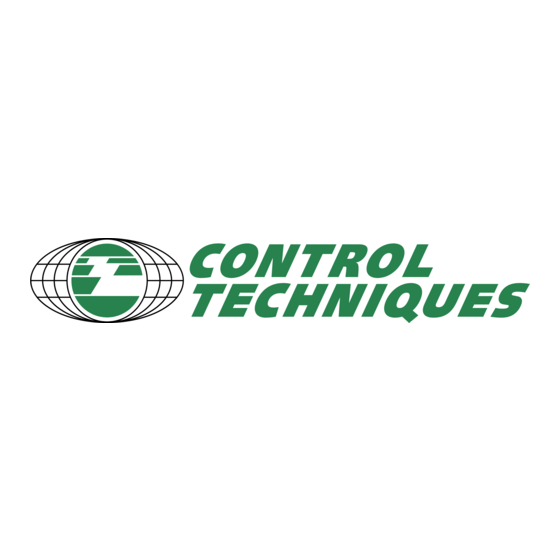Summary of Contents for Control Techniques Modbus TCP
- Page 1 User Guide: Communications module Profinet Profibus Modbus TCP Modbus RTU Ethernet/IP DeviceNet For use with D1/D2 soft starters...
- Page 2 Product Compatibility This communications module is suitable for use with Digistart D1 and D2 soft starters. NOTE: This module is not suitable for use with soft starters using 380/440 VAC control voltage. For the latest manuals and software, please visit our website.
-
Page 3: Table Of Contents
Contents Disclaimer .......................... 2 Important User Information ....................2 Warnings ..........................2 Installation ......................... 3 Device Configuration ......................5 PLC Configuration ......................8 Feedback LEDs ........................8 Operation ........................... 9 Modbus Registers ......................9 Network Design ....................... 13 Specifications ........................15 User Manual... -
Page 4: Disclaimer
Product Design The Modbus TCP Module allows the soft starter to connect to an Ethernet network and be controlled or monitored using an Ethernet communication model. Familiarity with Ethernet protocols and networks is required to operate the device successfully. -
Page 5: Installation
4. Push in the top and bottom retaining clips to secure the module to the starter. [C] 5. Connect Ethernet Port 1 or Port 2 on the Modbus TCP Module to the network. 6. Apply control power to the soft starter. - Page 6 The device is powered from the soft starter. For the soft starter to accept fieldbus commands, a link must be fitted across terminals A1-02 on the starter. The Modbus TCP Module is not suitable for use with compact soft starters using 380/440 VAC control voltage. Soft starter...
-
Page 7: Device Configuration
Overview The Modbus TCP Module is configured with a static IP address as default. To avoid IP address conflicts and to ensure successful deployment, we recommend that the device is connected directly to a PC or laptop to configure the IP address, before connecting to the network. - Page 8 1. Start a browser on the PC and enter the device address, followed by /ipconfig. The default address for a new Modbus TCP Module is 192.168.0.1. 2. Edit the settings as required. Click "Submit" to save the new settings. To store the settings permanently in the device, tick "Static".
- Page 9 Modbus TCP Module Device Configuration Ethernet Device Configuration Tool Use the Ethernet Device Configuration Tool to connect to the device if you do not know the IP address, or if the subnet mask of the web server does not match.
-
Page 10: Plc Configuration
The PLC must be configured to map registers within the module to addresses within the PLC. Example mapping of PLC registers to registers within the Modbus TCP Module (Target): The device must be configured directly in the PLC. No additional files are required. -
Page 11: Operation
Operation Operation The Modbus TCP Module must be controlled by a Modbus client (such as a PLC) which complies with the Modbus Protocol Specification. For successful operation, the client must also support all functions and interfaces described in this document. - Page 12 Modbus Registers Modbus TCP Module Status Reporting Registers (Read Only) Register Description Bits Details 30240 Starter state 0 to 3 1 = Ready 2 = Starting 3 = Running 4 = Stopping 6 = Tripped 1 = Positive phase sequence...
- Page 13 Modbus TCP Module Modbus Registers Legacy Mode The Modbus TCP Module can also operate in Legacy Mode, which uses the same registers as the Modbus RTU Module. Some registers differ from those specified in the Modbus Protocol Specification. Initialising Legacy Mode If the device has been operating in Standard Mode, it must be reset before communicating in Legacy Mode.
- Page 14 Modbus Registers Modbus TCP Module Trip Codes Trip Description Code Excess start time Motor overload Motor thermistor Current imbalance Frequency Phase sequence Power circuit Starter communication (between device and soft starter) Network communication (between device and network) Time-overcurrent (Bypass overload)
-
Page 15: Network Design
Modbus TCP Module Network Design Network Design The device supports star, line and ring topologies. 10.1 Star Topology In a star network, all controllers and devices connect to a central network switch. 10.2 Line Topology In a line network, the controller connects directly to one port of the first module. The second Ethernet port connects to another module, which in turn connects to another device until all devices are connected. - Page 16 Network Design Modbus TCP Module 10.3 Ring Topology In a ring topology network, the controller connects to the first module, via a network switch. The second Ethernet port of the module connects to another device, which in turn connects to another device until all devices are connected. The final device connects back to the switch.
-
Page 17: Specifications
Modbus TCP Module Specifications Specifications Enclosure • Dimensions ............40 mm (W) x 166 mm (H) x 90 mm (D) Weight ........................250 g Protection ......................... IP20 • Mounting Spring-action plastic mounting clips (x 2) • Connections Soft starter ..................6-way pin assembly Contacts ..................... - Page 20 7 1 0 - 2 1 3 7 8 - 0 0 A 7 1 0 - 2 1 3 7 7 - 0 0 A 7 1 0 - 2 1 3 7 6 - 0 0 A 7 1 0 - 2 1 3 7 5 - 0 0 A 7 1 0 - 2 1 3 7 4 - 0 0 A 7 1 0 - 2 1 3 7 3 - 0 0 A 7 1 0 - 2 1 3 7 2 - 0 0 A...















Need help?
Do you have a question about the Modbus TCP and is the answer not in the manual?
Questions and answers